Our equity, diversity and inclusion promise
Setting our strategic focus on equity, diversity, and inclusion to enhance content relevance and integrity
At BMJ Group, we recognise that equity, diversity, and inclusion (EDI) are integral to achieving our vision of a healthier world. Building on our advocacy of increasing patient and public involvement in clinical research and publishing, prioritising EDI enhances the integrity and relevance of our content, ensuring it is relevant for diverse audiences.
By confronting long-standing bias in medicine, academia, and the scholarly publishing landscape, we are taking decisive action to reshape our sector. We have established targeted initiatives—such as policy reforms, measurable inclusion benchmarks, and comprehensive training programmes—to drive sustainable change toward a diverse and inclusive environment.
BMJ Group’s EDI commitment ensures our efforts are future-focused, progressive, accountable, and impactful.
Advancing equity, diversity and inclusion
Our EDI strategy for Publishing and Events
The purpose of our EDI strategy is to increase diversity every year to reduce bias, improve equity, and enhance the quality, integrity and usefulness of our content.
What we are going to do
Enhance quality, integrity and impact by diversifying the people who create, curate and communicate content.
How we are going to do it
Progress on our promise
Whilst we still have lots more to do, we are proud of what we’ve accomplished so far, from journal-specific initiatives to cross-cutting projects to achieve change across our portfolio of journals.
This section highlights the impact of where we have integrated EDI into our publishing and events business, reducing bias, improving representation, and driving meaningful change.

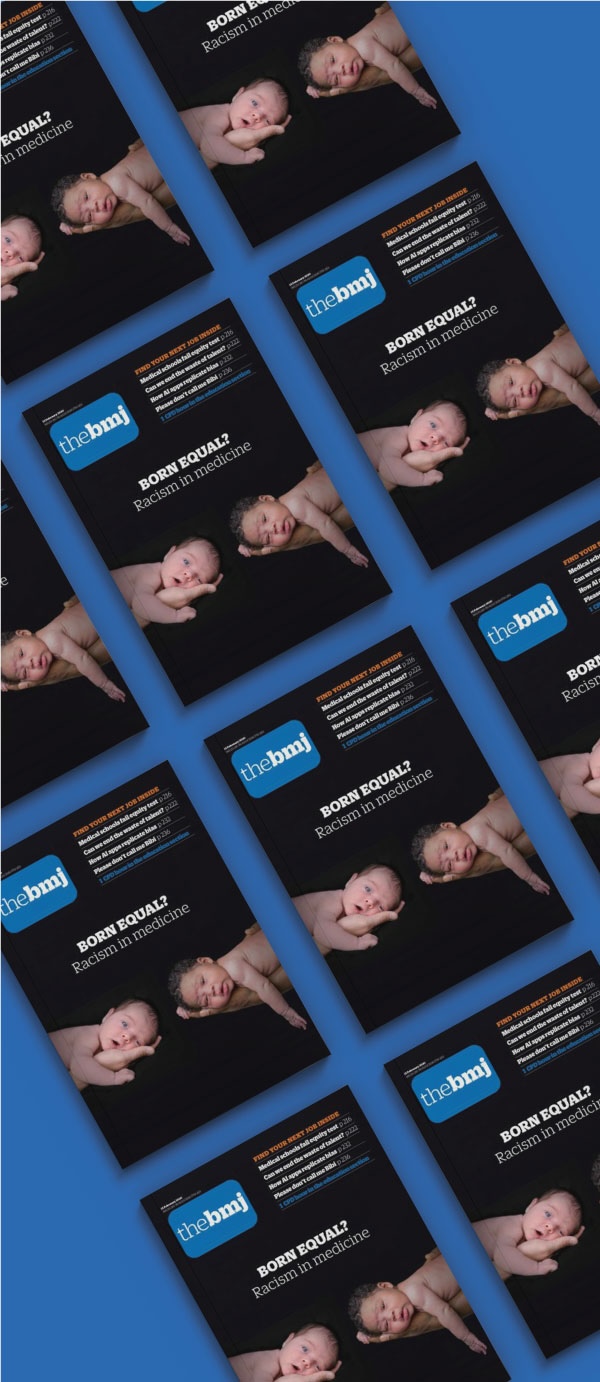
Advocating on issues related to EDI
Voicing opposition to racism: Since 2020, we have published landmark collections and ongoing coverage of racism in medicine. In February 2020, The BMJ highlighted the racial discrimination and health inequalities experienced by both patients and doctors in a special campaigning issue.
As the first journal publication solely focused on calling for action against racism in medicine, it directly contributed to the launch of the NHS Health and Race Observatory in May 2021.* It also:
- Exposed the lack of data on ethnic health inequalities
- Won the PPA Diversity and Inclusion Award 2021
- Led the University of Nottingham’s Medical Society to reverse a policy not to allow a representative from an ethnic minority group to sit on its committee
- Led to the BMA launching a charter calling on medical schools to end this abuse
Whilst notable progress has been made in tackling racism in medicine, challenges remain. Medical schools are now more transparent in handling complaints, and racial equity is increasingly embedded in NHS policies. There has also been a modest increase in ethnic minority representation in medical leaders on the NHS Board, in NHS Trusts, and at some medical royal colleges.
- 83% of UK medical schools now track racism complaints, up from 50% in 2020.
Ria Bansal, the BMA medical students committee co-deputy chair for student welfare, and a fourth year at University of Nottingham, told The BMJ that since 2020, she felt racial harassment and racism had become less of a “taboo topic,” and that grassroots activism from ethnic minority students and doctors was holding medical schools more accountable.
Journal-specific EDI initiatives led by BMJ Group
Through targeted initiatives, we strive to reduce bias, amplify diverse voices, and ensure our content reflects the global research community.
Driving meaningful change
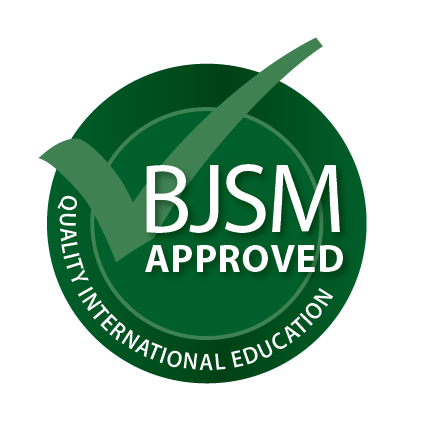
Supporting research in underrepresented regions
The British Journal of Sports Medicine editorial board drives positive change in sports and exercise medicine by prioritising equity, diversity, and inclusion (EDI). Through initiatives like Patient Voices, BJSM Stamp of Approval, and the Global SEM Mentoring Program, the journal amplifies underrepresented voices and supports marginalised communities. These efforts foster greater inclusivity in research, events, and mentorship, ensuring broader representation and impactful contributions within the field.
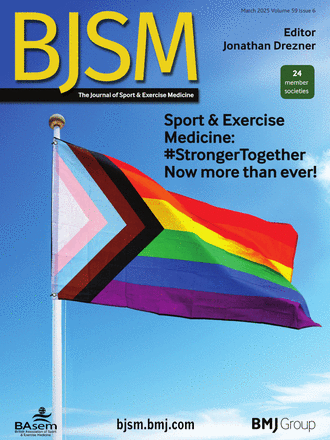
Promoting best practices in equitable publishing
The BJSM Global Research Grant Programme supports and enhances research in Sport and Exercise Medicine (SEM) within marginalised communities. By offering grants to researchers from underrepresented groups, the programme addresses disparities in resources and opportunities for SEM research, particularly in low and middle income countries (LMICs), and communities experiencing social and economic disadvantages. It also provides mentorship opportunities to help build capacity and encourage diverse voices in the SEM field.

“As The BMJ’s first Editor-in-Chief from an ethnic minority background, it’s been a privilege to influence industry-wide change and foster a more inclusive environment for all voices in medical publishing. This role has allowed me to champion diversity not just in our editorial team, but in the broader scientific community, helping to ensure that all perspectives are represented and valued.”
Kamran Abbasi, The BMJ Editor in Chief, BMJ Group Board member (Kamran is listed as one of the top 50 most influential Black, Asian and minority ethnic leaders in English health and care).
Advancing global equity in an open access world
At BMJ Group, we support authors from LMICs to publish their research by means of open access in their journal of choice. We do this by expanding waiver and discount policies, and provide access to paywalled content for LMIC researchers through the Research4Life programme.

Empowering authors from LMICs with an expanded waiver policy
Our waiver policy has been updated so that all BMJ journals offer waivers for the full Article Processing Charge (APC) with a 100% discount for authors in LMICs. The scope of our programme includes 50 more countries, making many more authors eligible. This has led to:
- A 130% increase in waivers being granted to authors from LMICs
- A 45% increase in the number of waived articles published by authors in LMICs
- A 50% increase in the number of authors in over 20 different LMICs for whom we’ve helped to find the right journal for their research
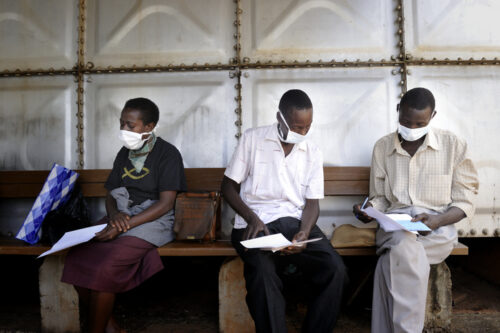
Advancing global health research through open access
When Dr Bruce J Kirenga, Chief Research Scientist and founding Director of the Makerere University Lung Institute, investigated the use of convalescent plasma for covid-19 treatment in Uganda, he knew his findings needed to reach those who could act on them—without financial barriers.
By publishing open access in BMJ Open Respiratory Research, his research was rapidly disseminated, informing the work of intergovernmental organisations such as the European Respiratory Society think tank, Pan American Health Organization (PAHO), and the World Health Organization.
Published in 2021, Efficacy of convalescent plasma for treatment of covid-19 in Uganda has received 30 academic citations and 25 policy and clinical guideline citations across the USA, Switzerland, and Germany. By publishing open access, this LMIC-based researcher provided vital evidence against convalescent plasma, directly influencing global covid-19 treatment strategies.
“Open access publishing ensures publications are available to everyone, including scientists and policy makers in low resourced settings…” Dr Bruce J Kirenga, Makerere University Lung Institute, Uganda
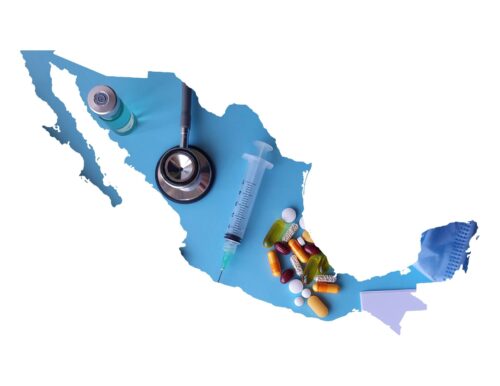
Contributing to rising research output in LMICs
Since 2002, BMJ Group has contributed to improving global health by participating in the WHO’s Research4Life Organization’s Access to Research Initiative (HINARI). This programme grants free access to nearly 20,000 journals and e-books to health workers and researchers in more than 100 developing countries.
A recent study by the World Intellectual Property Organization (WIPO) revealed that the Research4Life initiative has directly contributed to a significant increase in scientific output. In LMICs, research production in health sciences has increased by up to 75%, and clinical trial activity has risen by up to 35%.
Supporting inclusive editorial practices
Author name change policy for trans scholars and others
As changing one’s name is a deeply personal decision, we acknowledge that an individual might not wish to disclose the change to a large audience. Authors have the option to update their name with or without indication that a change has been made. The changes will be made directly on the article(s). Unless explicitly requested, BMJ Group will not include a notice of correction in any format.
Reducing bias in medical publishing
We take meaningful action to advance EDI in the areas we can influence. We are creating a more inclusive research environment by fostering balanced representation among editors and authors and addressing systemic biases.
We actively support clinicians and researchers worldwide in publishing high-quality work—regardless of sex, gender, race, ethnicity, first language, sexual orientation, religion, disability status, age, nationality, or citizenship. In doing so, we help dismantle barriers that have historically excluded underrepresented groups, enabling them to share their research and advance their careers.
The impact of editorial diversity is clear. Research shows that when editorial boards lack racial diversity, scholars studying race are less likely to submit their work, believing it won’t be valued or published. However, when journals have diverse editorial leadership, scholars report greater confidence in the journal and its commitment to inclusion. By diversifying our editorial boards, we send a powerful message: all high quality research is valued, and all voices deserve to be heard.
Embracing inclusive language and evolving our editorial style
Across the Group, a comprehensive writing style guide is a vital resource used across editorial, product, advertising, marketing, and patient leaflets to ensure clarity, consistency, and inclusivity. A key strength is its dedicated EDI section, which now includes the Gender and Sex Executive Summary under #non-discriminatory language, reinforcing our commitment to accurate and respectful communication. The guide continues to evolve with colour coding for easy navigation, and the inclusion of executive summaries on age, ethnic groups, and geopolitics.

Acting on historically offensive content in our archive
Balancing the need to acknowledge harm with the integrity of the scientific record is essential. When concerns are raised—whether by readers or through internal review—we assess them carefully. If content is found to be potentially offensive or harmful, we provide clear disclaimers to ensure transparency. As evidence evolves and public debate shifts, we may correct or retract historical content to reflect current understanding. This approach allows us to uphold both accountability and the credibility of the published record.
Our exploratory work in this important area involved invaluable input from representatives from the Royal Historical Society, our internal staff cultural inclusion group, our Committee on Ethics and AI, the British Library’s anti-racism project, and archivists at the London School of Tropical Medicine and Hygiene.
Championing EDI leadership and collaboration
Empowering change: staff-led editorial initiatives for inclusive publishing
BMJ Group has actively engaged in staff-led editorial initiatives to enhance EDI throughout its publication process. Everything, from how we interact with authors, reviewers, and editors to our daily business, is scrutinised to ensure we provide a fairer and more inclusive service for everyone.
We are doing this to create better ways to disseminate important research and help us move toward a world where our sector can fully benefit from everyone’s work, regardless of gender, sex, cultural position, or religious beliefs.
Participation in industry-wide EDI groups
Part of our work includes having dedicated staff actively participating in industry-wide EDI groups such as Association of Learned and Professional Society Publishers (ALPSP), Coalition for Diversity and Inclusion in Scholarly Communications (C4DISC), and the Joint Committee for Action on Inclusion and Diversity in Publishing.
These collaborations enable us to stay at the forefront of EDI efforts in publishing, sharing best practices, and contributing to initiatives that promote inclusivity and reduce bias across the industry.
Diversity leads to better research
#PublishingEquality | As an organisation, we united with our fellow publishers to make research publishing more inclusive and diverse. We signed an agreement to take a proactive stance against bias, as we commit to working together to better reflect the diversity of their communities and to remove barriers for under-represented groups.
The joint agreement impacts scholarly publishing on a global scale, having been initiated by the Royal Society of Chemistry and signed by the American Chemical Society (ACS), BMJ Group, Cambridge University Press, the Company of Biologists, Emerald Publishing, Elsevier, Hindawi, IOP Publishing, Oxford University Press and the Royal Society. We are also engaging with more publishers to form a working group to collaborate on further actions to improve inclusion and diversity in publishing.
Educational webinars on diversity in publishing
Across events and publishing, our work includes promoting EDI in publishing through initiatives like educational webinars. These sessions focus on topics such as unconscious bias in peer review and increasing diversity in editorial boards.
Our BMJ Future Health programme has been designed to help health professionals tackle health inequalities by fostering diversity in digital health. The conference discusses equity in healthcare apps, personalised medicine, and evidence generation for digital health solutions. Sessions also focus on scaling digital care pathways, remote monitoring, and prioritising user-centred systems implementation. These initiatives reflect our commitment to inclusive healthcare innovation.
On International Women’s Day 2021, as a business, we formally adopted a ‘no manels’ policy.
With that, we state with complete conviction that BMJ Group staff will not participate in or chair panels made up exclusively of men.
Work experience programme for students on free school meals
Our work experience programme is a robust initiative that supports minority individuals and contributes to societal efforts to promote equity and inclusion. Participants in our programme gain practical insights into various workplace skills, enhance their career prospects, and build their interpersonal skills. Exposing students to professional environments makes these settings more accessible and less intimidating, fostering a sense of belonging.
The programme builds community partnerships with local schools, ensuring that it reaches those who need it most and maximises student development. Unlike traditional human resource efforts, our initiative reflects our deep commitment to addressing educational inequalities. It does this by providing valuable work experience in a way that also actively promotes social mobility. Our work experience programme helps to differentiate BMJ Group from other organisations, demonstrating our dedication to creating meaningful and lasting change.
Investing in these students’ potential paves the way for a more equitable society. We set a precedent for other organisations and showcase how targeted initiatives can drive broader social transformation.
Inspiring the next generation of STEM professionals through In2Science
BMJ Group colleagues recently participated in a webinar with the In2Science charity, sharing their career journeys with young people. The session, “Shaping the Future of Global Health: Careers in Healthcare Research and Education,” featured the Group’s Comfort King, Kristoffer Stewart, Emily Houghton, and Josephine Weisflog.
BMJ Group is home to many talented individuals. To advance our vision of helping to create a healthier world, we must engage and inspire young people to pursue STEM careers. By showing them the diverse, impactful opportunities available within the STEM field, we can encourage the next generation to explore careers that align with their passions and make a difference.
“The speakers “were fantastic, generously sharing their personal insights and career success tips. The personal insights and advice they shared were incredibly valuable to our In2careers members.”
In2Science
Supporting diversity in journalism
BMJ Group is also an official partner of the National Council for the Training of Journalists’ (NCTJ) Journalism Diversity Fund (JDF). This means we contribute financially and actively participate in the JDF’s mentoring programme by allowing successful candidates to gain insights into the specialised branch of journalism.
Looking ahead
Across the business, we continually assess what we can do to strengthen our EDI efforts further.
Meet the BMJ Group equity, diversity and inclusion steering group

Helen Macdonald
(Co-Chair)
Publication Ethics & Content Integrity Editor

Mark Richards
(Co-Chair)
Head of Content Growth

Theo Bloom
Executive Editor, The BMJ

Devyani Mahajan
Equality, Diversity and Inclusion Assistant

Margherita Zorzetto
Head of Employee Experience

Jade Koo
Transfer Editor

